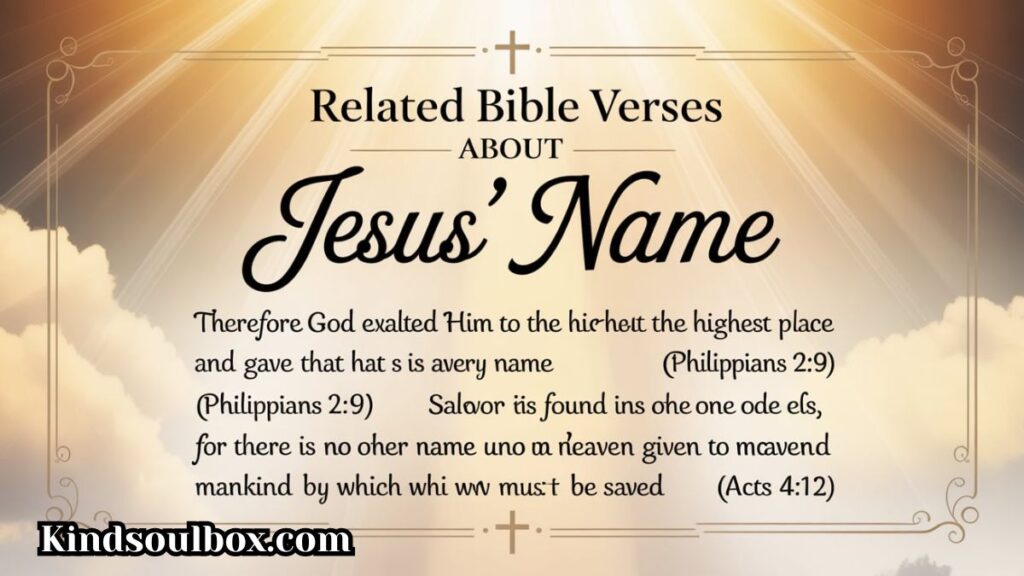“What a Beautiful Name Bible Verse” refers to Philippians 2:9-11, the Scripture passage declaring God exalted Jesus Christ above every authority. This biblical reference reveals why Jesus’ name carries supreme power and divine authority throughout heaven and earth. The verse captures the essence of Christian belief about the Savior’s exalted name.
Millions sing Hillsong’s worship anthem without realizing every lyric flows directly from ancient Scripture. This isn’t modern poetry—it’s a 2,000-year-old truth that Paul penned while imprisoned. The beautiful name mentioned isn’t just a metaphor. It represents the source of salvation that transforms lives daily. This glorious name silences demons, heals bodies, and changes eternal destinies.
The Philippians 2:9-11 passage sits at Christianity’s core, explaining why believers pray “in Jesus’ name” and why that lovely title matters more than any earthly authority. This holy text connects Old Testament prophecy to New Testament fulfillment, showing how God’s plan centered on one revered name. Understanding this verse unlocks the spiritual strength behind Christian worship and the divine power available through faith in Christ.
The Origin: Philippians 2:9-11 Unpacked
The Complete Scripture Text
Here’s the biblical reference that started it all:
NIV Translation:
“Therefore God exalted him to the highest place and gave him the name that is above every name, that at the name of Jesus every knee should bow, in heaven and on earth and under the earth, and every tongue acknowledge that Jesus Christ is Lord, to the glory of God the Father.”
ESV Translation:
“Therefore God has highly exalted him and bestowed on him the name that is above every name, so that at the name of Jesus every knee should bow, in heaven and on earth and under the earth, and every tongue confess that Jesus Christ is Lord, to the glory of God the Father.”
KJV Translation:
“Wherefore God also hath highly exalted him, and given him a name which is above every name: That at the name of Jesus every knee should bow, of things in heaven, and things in earth, and things under the earth; And that every tongue should confess that Jesus Christ is Lord, to the glory of God the Father.”
Notice the pattern? Every translation emphasizes the exalted name and universal recognition of Christ.
Historical and Cultural Context
Ancient cultures understood something we’ve largely forgotten: names in biblical context carried immense weight. They weren’t just labels.
In the Ancient Near East, your name defined your essence. When Abraham became Abram, God wasn’t playing word games. He was declaring a personal transformation—from “exalted father” to “father of many nations.” When Jacob wrestled with God and became Israel, his identity shifted permanently.
The Messiah‘s name carries even deeper significance. In Hebrew, Yeshua (Jesus) literally means “Yahweh saves.” His name isn’t decorative. It’s prophetic.
The Greco-Roman world that Paul wrote to understood divine names differently. They had pantheons filled with gods whose names supposedly held magical power. Paul’s declaration that one name—Jesus Christ—supersedes all others? That was revolutionary. Scandalous, even.
Verse-by-Verse Breakdown
“Therefore God exalted him to the highest place”
This follows the famous kenosis passage where Christ emptied himself. He descended. He humbled himself to death on a cross. Now comes the reversal: God lifts him to the supreme power position. This isn’t just restoration. It’s exaltation beyond measure.
“The name that is above every name”
Not a name. The name. This glorious name doesn’t compete with other titles. It transcends them all. Caesar? Buddha? Zeus? Every authority, spiritual or earthly, bows before this lovely title.
“Every knee should bow”
Three realms: heaven, earth, and under the earth. Angels bow. Humans bow. Even demons must acknowledge His divine authority. This isn’t optional or polite. It’s cosmic inevitability.
“Every tongue acknowledge that Jesus Christ is Lord”
The Greek word kyrios (Lord) was the title used for Roman emperors. It was also how Greek-speaking Jews referred to Yahweh. Paul’s claiming both: Jesus is God, and Jesus is King. That’s the heart of Christian worship.
Related Bible Verses About Jesus’ Name

Old Testament Prophecies
The beautiful name wasn’t revealed suddenly. God prepared His people through prophecy.
Isaiah 9:6 declares:
“For to us a child is born, to us a son is given, and the government will be on his shoulders. And he will be called Wonderful Counselor, Mighty God, Everlasting Father, Prince of Peace.”
Four titles. Each one reveals the Savior‘s nature. Counselor speaks to wisdom. Mighty God declares divinity. Everlasting Father shows His eternal care. Prince of Peace promises tranquility and reassurance.
Isaiah 7:14 prophesied:
“Therefore the Lord himself will give you a sign: The virgin will conceive and give birth to a son, and will call him Immanuel.”
Immanuel means “God with us.” That’s not just proximity. It’s intimate bond—God entering human experience completely.
Psalm 8:1 captures the response:
“Lord, our Lord, how majestic is your name in all the earth!”
Majesty and reverence characterize this sacred name.
Gospel Accounts
Matthew 1:21 records the angel’s instruction to Joseph:
“She will give birth to a son, and you are to give him the name Jesus, because he will save his people from their sins.”
The name was divinely assigned. Jesus’ name is mission statement, not random selection.
Luke 1:31 shows Gabriel telling Mary:
“You will conceive and give birth to a son, and you are to call him Jesus.”
Both parents received the same instruction. No debate. No alternatives. This Son of God would bear this specific title.
John 1:14 provides theological depth:
“The Word became flesh and made his dwelling among us. We have seen his glory, the glory of the one and only Son, who came from the Father, full of grace and truth.”
The Redeemer is the eternal Word made tangible. Philosophy became person. Truth became touchable.
Acts and Epistles
Acts 4:12 gives us perhaps the boldest claim in Christianity:
“Salvation is found in no one else, for there is no other name under heaven given to mankind by which we must be saved.”
No other path. No alternative salvation source. Peter wasn’t being narrow-minded—he was being honest about reality.
Ephesians 1:20-21 expands the scope:
“He raised Christ from the dead and seated him at his right hand in the heavenly realms, far above all rule and authority, power and dominion, and every name that is invoked, not only in the present age but also in the one to come.”
Past, present, and future. The ultimate control extends through all time.
Hebrews 1:4 connects inheritance to identity:
“So he became as much superior to the angels as the name he has inherited is superior to theirs.”
His name wasn’t earned through achievement. It was inherited as rightful Son of God.
Revelation 19:13 reveals mystery:
“He is dressed in a robe dipped in blood, and his name is the Word of God.”
Names plural throughout Revelation. Some known. Some hidden. All powerful.
Theological Meaning: Why Jesus’ Name Matters
Names Reveal Character in Scripture
Hebrew thought connects name with nature inseparably. When God renamed Abram to Abraham, He wasn’t updating identification. He was declaring destiny.
When Jacob became Israel (“one who struggles with God”), the name captured his life story. Every biblical name change signals spiritual growth or divine intervention.
Jesus Christ carries multiple names because His nature requires multiple descriptions. He’s Savior (rescuing from sin). He’s Messiah (anointed King). he’s Redeemer (buying back what was lost). Each title reveals another facet of His mission and character.
The Divine Authority Behind the Name
Jesus’ name carries supernatural power unmatched in human history. This isn’t superstition or magic. It’s reality.
Mark 16:17 records Jesus saying:
“And these signs will accompany those who believe: In my name they will drive out demons.”
Demons recognize heavenly force in that name. They must submit to its spiritual authority.
Acts 3:6 shows practical application. Peter told the boring beggar:
“Silver or gold I do not have, but what I do have I give you. In the name of Jesus Christ of Nazareth, walk.”
The man walked. Immediately. The divine power in that name accomplished what medicine couldn’t.
John 14:13-14 promises:
“And I will do whatever you ask in my name, so that the Father may be glorified in the Son. You may ask me for anything in my name, and I will do it.”
Prayer backed by His name gains access to godly energy that transforms reality.
Matthew 7:22 warns of misuse:
“Many will say to me on that day, ‘Lord, Lord, did we not prophesy in your name and in your name drive out demons and in your name perform many miracles?'”
The name has power. But using it without genuine faith and relationship with God means nothing.
The Name as Covenant Fulfillment
God promised Abraham that through his offspring all nations would be blessed. Jesus fulfills that ancient covenant.
The Messianic expectations throughout Jewish Scripture pointed toward one person. One revered name. One complete redemption provider.
The New Testament establishes a new covenant through His blood. His name seals that agreement. Every believer enters this spiritual link by calling on His name in conviction and faith.
The Power of Jesus’ Name in Scripture

Salvation Through the Name
Romans 10:13 makes salvation accessible:
“Everyone who calls on the name of the Lord will be saved.”
Not everyone who performs rituals. Not everyone who follows rules perfectly. Everyone who calls. That’s the path to saving laid out clearly.
Acts 2:21 echoes this:
“And everyone who calls on the name of the Lord will be saved.”
Peter quoted Joel’s prophecy on Pentecost. The Holy Spirit came. The church began. And the deliverance origin traces to calling on Jesus’ name.
1 Corinthians 6:11 describes personal transformation:
“And that is what some of you were. But you were washed, you were sanctified, you were justified in the name of the Lord Jesus Christ and by the Spirit of our God.”
Past tense. Completed action. Conversion happened because of the name.
Healing and Deliverance
Acts 3:1-10 details the famous healing at the Beautiful Gate. Peter said:
“In the name of Jesus Christ of Nazareth, walk.”
The man didn’t just walk. He jumped. He praised God. The spiritual rescue extended beyond medical healing to complete restoration.
Acts 16:18 shows Paul confronting demonic possession:
“In the name of Jesus Christ I command you to come out of her!”
The demon obeyed immediately. The heavenly command in that name carries absolute divine authority.
James 5:14 instructs the church:
“Is anyone among you sick? Let them call the elders of the church to pray over them and anoint them with oil in the name of the Lord.”
Prayer. Anointing. The name. Combined for healing and consolation.
Prayer and Intercession
John 14:13-14 establishes prayer protocol:
“And I will do whatever you ask in my name, so that the Father may be glorified in the Son.”
Praying “in Jesus’ name” isn’t a magic formula. It means praying according to His character, His will, and His authority. It creates direct relational connection with God.
John 15:16 connects fruitfulness to prayer:
“Then the Father will give you whatever you ask in my name.”
Effective prayer flows through this spiritual link. It’s the divine rapport that makes personal prayer powerful.
John 16:23-24 promises complete joy:
“My Father will give you whatever you ask in my name. Ask and you will receive, and your joy will be complete.”
Not partial joy. Complete joy. That’s the promise attached to praying in His name.
“What a Beautiful Name” Song Connection
Lyrical Theology Breakdown
Hillsong’s song isn’t just emotional music. It’s systematic theology set to melody.
“You didn’t want heaven without us, so Jesus, You brought heaven down” captures the incarnation from John 1:14.
“Death could not hold You, the veil tore before You” references the resurrection and Matthew 27:51.
“You silence the boast of sin and grave” echoes 1 Corinthians 15:55: “Where, O death, is your victory?”
The bridge declares: “Yours is the Name that saves”—direct reference to Acts 4:12.
Every line roots in biblical reference. The liturgy becomes devotion. The adoration reflects doctrine.
Why This Song Resonates
Modern Christian worship often separates emotion from theology. “What a Beautiful Name” bridges that gap perfectly.
The melody is simple enough for children. The theology is deep enough for scholars. That balance creates universal appeal.
It captures the emotional comfort that Jesus’ name provides while maintaining theological precision. You can feel the peace and understand the faith simultaneously.
The song became an anthem because it articulates what believers feel but struggle to express: that the name of Jesus is both powerful and personal, majestic and intimate.
Practical Application: Living in the Power of His Name
In Personal Worship
Praise begins with recognizing who God is. Using Jesus’ name in worship isn’t repetition. It’s recognition.
When you meditate on His attributes through His names—Savior, Redeemer, Messiah, Son of God—you’re aligning your thoughts with truth. You’re letting spiritual strength reshape your perspective.
Gratitude flows naturally when you understand your identity in Christ. You’re not just religious. You’re in intimate bond with the Creator through His name.
In Spiritual Warfare
Ephesians 6 describes spiritual armor. But the offensive weapon is “the sword of the Spirit, which is the word of God.” That sword includes declaring Jesus’ name against temptation.
When anxiety attacks, speaking His name brings reassurance. When doubt creeps in, remembering His name restores faith. when sin tempts, calling on His name provides spiritual rescue.
This isn’t superstition. It’s standing on the heavenly force that Scripture promises operates through His name.
In Daily Life and Witness
You represent Jesus’ name to the world. Your integrity reflects on His reputation. Your kindness demonstrates His character. your honesty upholds His truth.
Acts 11:26 tells us believers were first called Christians in Antioch. The name literally means “little Christs.” People saw Jesus in them.
That’s the standard. Not perfection, but genuine renewal. Not flawlessness, but authentic personal transformation.
Baptism publicly declares allegiance to His name. It’s a direct relational connection made visible. Every believer announces: “I belong to Jesus Christ.”
In Church Community
Matthew 18:20 promises:
“For where two or three gather in my name, there am I with them.”
Christian worship isn’t solo activity. We gather corporately in His name. The church service becomes spiritual connection point.
Communion (the Lord’s Supper) remembers His sacrifice. We eat and drink “in remembrance” of Him. His name sanctifies the ordinary elements.
Discipleship happens in His authority. Matthew 28:19 commands making disciples and baptizing “in the name of the Father and of the Son and of the Holy Spirit.” His name authorizes the mission.
Conclusion
What a Beautiful Name Bible Verse in Philippians 2:9-11 isn’t just poetry. It’s reality. Jesus’ name holds divine authority over everything. His exalted name brings salvation, healing, and hope. Every knee will bow. What a Beautiful Name Bible Verse. Every tongue will confess. That’s not religious theory—it’s coming truth. The beautiful name of Jesus Christ changed history forever.
You can experience this supernatural power today. What a Beautiful Name Bible Verse offers direct relational connection with God through faith. What a Beautiful Name Bible Verse. Call on Jesus’ name right now. Let His spiritual strength transform your life. What a Beautiful Name Bible Verse. This sacred name provides emotional comfort, redemption, and eternal peace. What a Beautiful Name Bible Verse. The Savior’s name is beautiful because it saves. That’s the glorious name above all names.
FAQS
What is the What a Beautiful Name Bible Verse?
The What a Beautiful Name Bible Verse is Philippians 2:9-11, which declares God gave Jesus the name above every name and that every knee will bow before Him.
Who wrote Philippians 2:9-11?
The apostle Paul wrote this Scripture around 62 AD while imprisoned in Rome. He sent it to the church in Philippi to encourage their faith in Christ.
Why is Jesus’ name called beautiful in the Bible?
Jesus’ name is beautiful because it means “Yahweh saves” and represents complete salvation, divine authority, and redemption for all who believe in Him as Savior.
When did Hillsong write “What a Beautiful Name”?
Hillsong Worship released “What a Beautiful Name” in 2016. The song won Grammy and Dove Awards, becoming one of the most-sung Christian worship songs globally.
How do I use Jesus’ name in prayer?
Pray in Jesus’ name by aligning your requests with His character and will. It’s not a magic formula—it’s praying through His divine authority with genuine faith and conviction.









